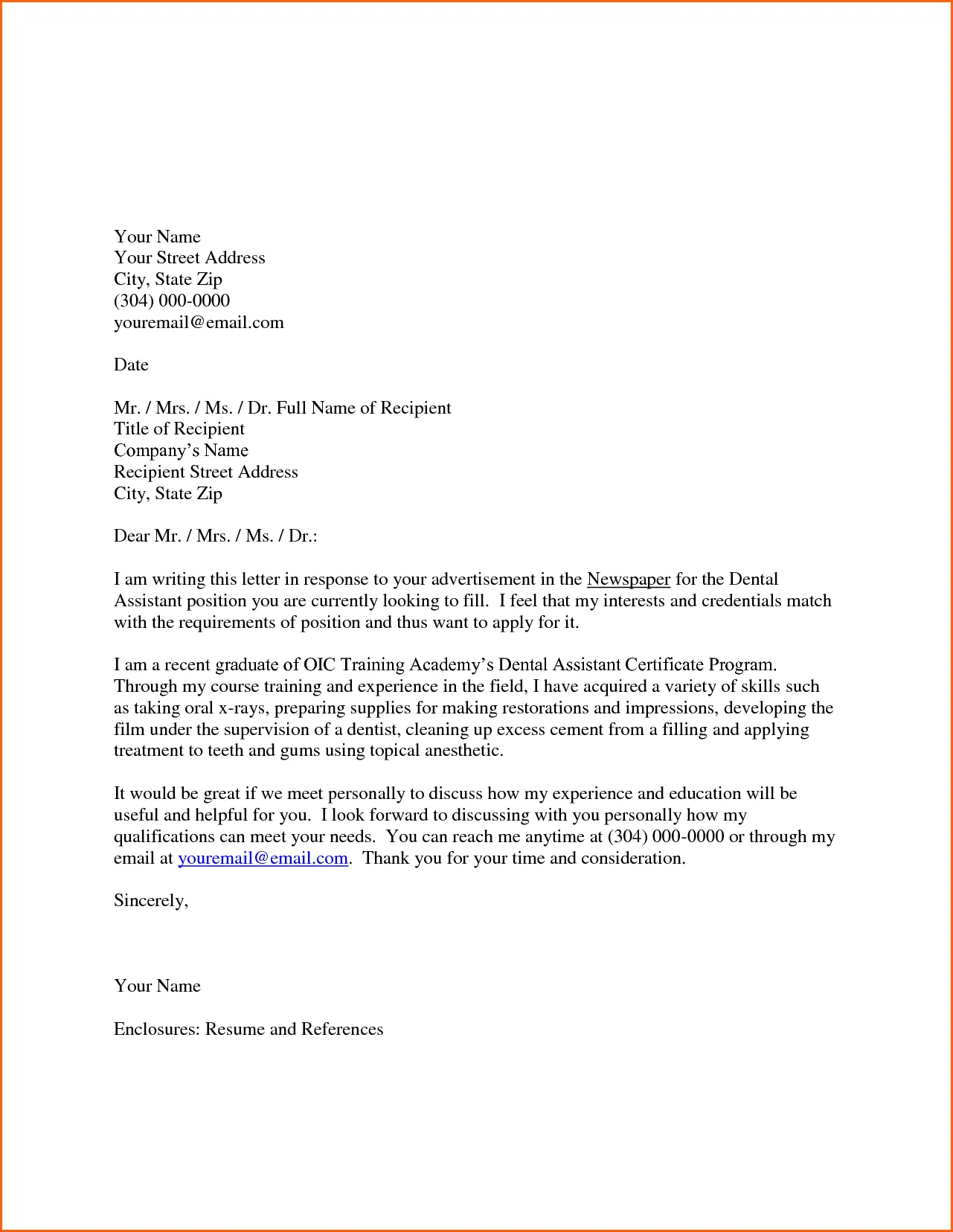The Importance of a Strong Cleaners Cover Letter
In the competitive job market, a well-crafted cleaners cover letter can be your key to unlocking opportunities. It’s more than just a formality; it’s your first impression and a chance to showcase your skills, experience, and personality. A strong cover letter can grab the attention of potential employers and differentiate you from other applicants. It is an opportunity to elaborate on the information provided in your resume, providing a more in-depth understanding of your qualifications and suitability for the role. It allows you to highlight specific achievements, demonstrate your understanding of the job requirements, and express your enthusiasm for the position, giving you a significant advantage in the application process. Consider it as your personal introduction, making you stand out from the crowd and increasing your chances of landing an interview.
Highlighting Your Cleaning Skills and Experience
Your cover letter is the perfect place to showcase your cleaning skills and experience, making sure to emphasize the tasks you are proficient in and the environments you have worked in. This section should provide concrete examples and measurable achievements to demonstrate your capabilities. Rather than just listing tasks, explain how you have used your skills to deliver exceptional results. For example, instead of writing “Performed general cleaning duties,” you could say, “Consistently maintained clean and sanitary conditions in high-traffic areas, including dusting, vacuuming, and mopping, resulting in positive feedback from clients.” This approach helps potential employers see the value you bring to their team.
Cleaning Tasks to Mention
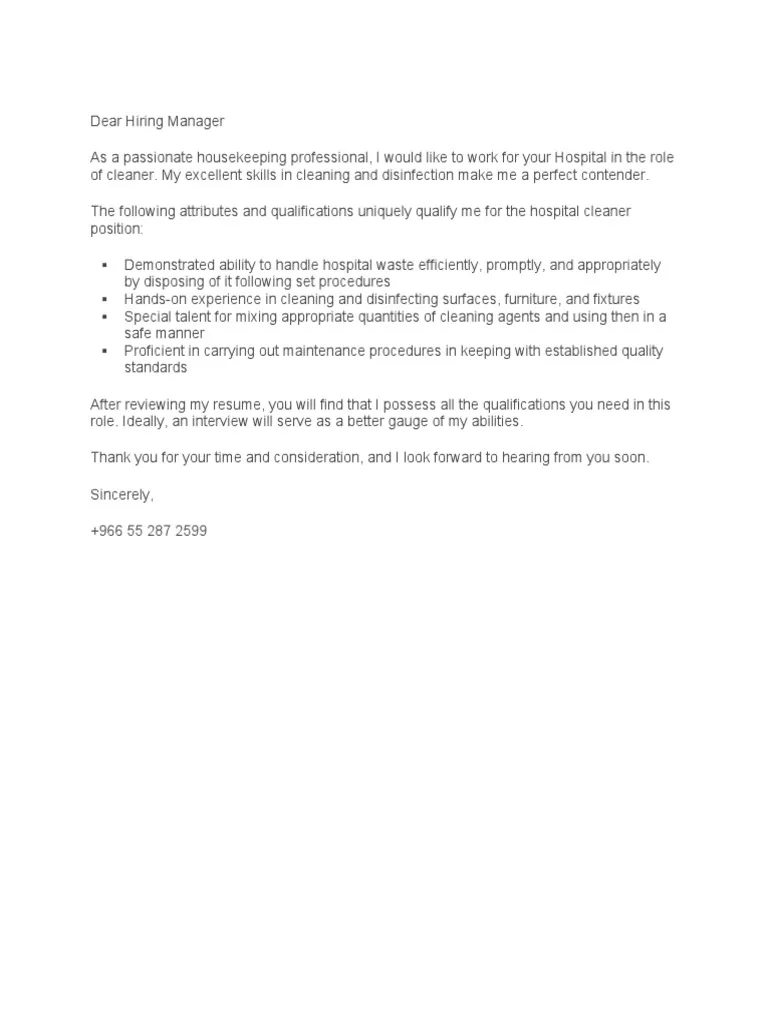
Mentioning specific cleaning tasks that you’re experienced with helps potential employers understand your skillset. Be sure to include a range of tasks to showcase your versatility and adaptability. Consider including dusting, vacuuming, mopping, sweeping, window cleaning, restroom sanitation, and trash disposal. Furthermore, you can add specialized skills, such as carpet cleaning, upholstery cleaning, or experience with industrial cleaning equipment. Tailor the list to the job description, and ensure you can confidently perform each task. By providing a detailed list, you demonstrate your comprehensive cleaning knowledge and increase your chances of being considered a well-rounded candidate, further increasing your chances of getting hired.
Experience in Different Cleaning Environments
Highlighting your experience in various cleaning environments can make your cover letter stand out. Specify the types of environments you’ve worked in, such as residential homes, offices, hospitals, schools, or industrial facilities. If you have experience in different settings, this shows your adaptability and versatility. For each environment, mention the specific tasks you performed and any special considerations you had to take. For example, in a hospital, you might have followed strict hygiene protocols, while in an office, you might have needed to be discreet and efficient during business hours. Providing details about your previous cleaning experience shows your broad range of skills and your ability to adapt to different work environments. This will make you a very competitive applicant.
Showcasing Your Professionalism and Reliability
Professionalism and reliability are essential qualities for a cleaner. Your cover letter should emphasize these qualities through your language, tone, and specific examples. Show your commitment to delivering high-quality work and being a dependable team member. Use a professional tone throughout your cover letter; avoid slang or overly casual language. Additionally, it’s important to show examples of your reliability by referencing past experiences where you consistently met deadlines, followed instructions, and maintained a high standard of cleanliness. Highlighting these aspects in your cover letter makes you look as a trustworthy and dedicated candidate.
Punctuality and Time Management
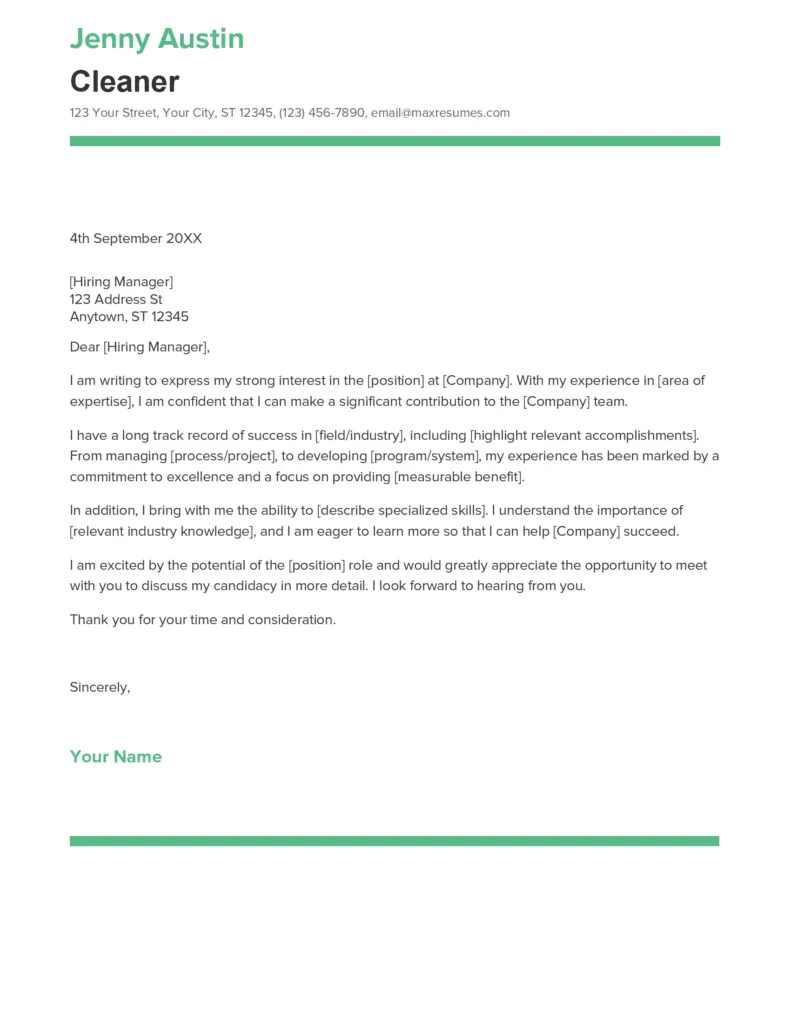
Punctuality and effective time management are crucial in cleaning roles. Mention your ability to arrive on time and complete tasks efficiently, because cleaners are often required to work independently and manage their time effectively. You can provide examples of how you’ve managed your time in past roles, like how you organize your tasks or how you meet deadlines efficiently. Being punctual and managing time efficiently ensure that cleaning schedules are met, and the work is completed on time, which is a highly valued trait in the cleaning industry, making you more appealing to potential employers.
Attention to Detail
Attention to detail is a critical skill for cleaners, and you should highlight this in your cover letter. Mention your ability to spot imperfections, ensuring that all areas are thoroughly cleaned and maintained. Provide concrete examples of how you’ve demonstrated attention to detail in past roles. This could include meticulously cleaning hard-to-reach areas, ensuring surfaces are spotless, or addressing any minor issues. Using specific examples can help prospective employers visualize your work ethic. By focusing on these details, you show that you can consistently deliver excellent results and take pride in your work, which is a key requirement for the role.
Tailoring Your Cover Letter to the Specific Job
Tailoring your cover letter to the specific job is critical for demonstrating your genuine interest in the position and increasing your chances of getting hired. Review the job description carefully and identify the key requirements, skills, and experiences that the employer is looking for. Customize your cover letter by highlighting the relevant skills and experiences that match these requirements. Avoid using a generic cover letter. Instead, make sure to showcase specific examples of how your qualifications align with the job duties. By demonstrating your understanding of the role and tailoring your cover letter, you demonstrate your genuine interest and increase your odds of standing out from other applicants.
Researching the Employer
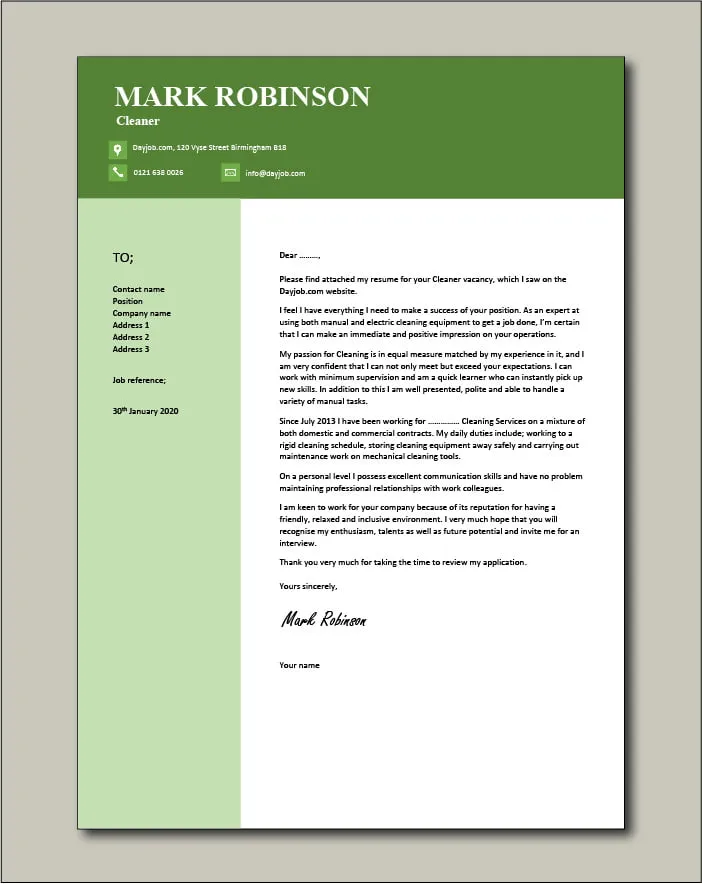
Researching the employer demonstrates initiative and a sincere interest in the company. Before you start writing your cover letter, learn more about the company’s values, mission, and the specific needs of the role. This information will allow you to personalize your cover letter, showcase your understanding of the company, and emphasize how your skills align with their needs. This approach demonstrates you’re not just applying for any job; you’re applying for this specific one. This can be achieved by visiting the company’s website, looking for news articles, or checking their social media accounts. By aligning your skills and experiences with the company’s values, you create a compelling narrative that sets you apart from the competition.
Matching Skills to Job Requirements
Carefully compare your skills and experiences to the requirements listed in the job description. Identify the key skills and experiences that the employer is looking for. Tailor your cover letter by highlighting how your qualifications match these needs. Use the same keywords and phrases used in the job description to emphasize your qualifications, but make sure to incorporate them naturally into your writing. For instance, if the job description emphasizes attention to detail and time management, make sure to provide examples of how you’ve demonstrated these skills in past roles. By directly matching your skills to the job requirements, you demonstrate your suitability for the role and increase your chances of impressing the hiring manager, making you an ideal candidate.
Formatting and Structure of Your Cleaners Cover Letter
The formatting and structure of your cleaners cover letter are as important as the content itself. A well-formatted cover letter is easy to read and allows the employer to quickly grasp your key qualifications. Begin with a clear header that includes your contact information and the date. Use a professional font, such as Arial or Times New Roman, and maintain a consistent font size throughout the document. Make sure to write the body of your cover letter into concise paragraphs and use bullet points to highlight your skills and experiences. Keep the length to one page to maintain focus. This format will keep the employer focused on the most important aspects of your qualifications, and showcase you as a well-organized professional.
Contact Information and Salutation
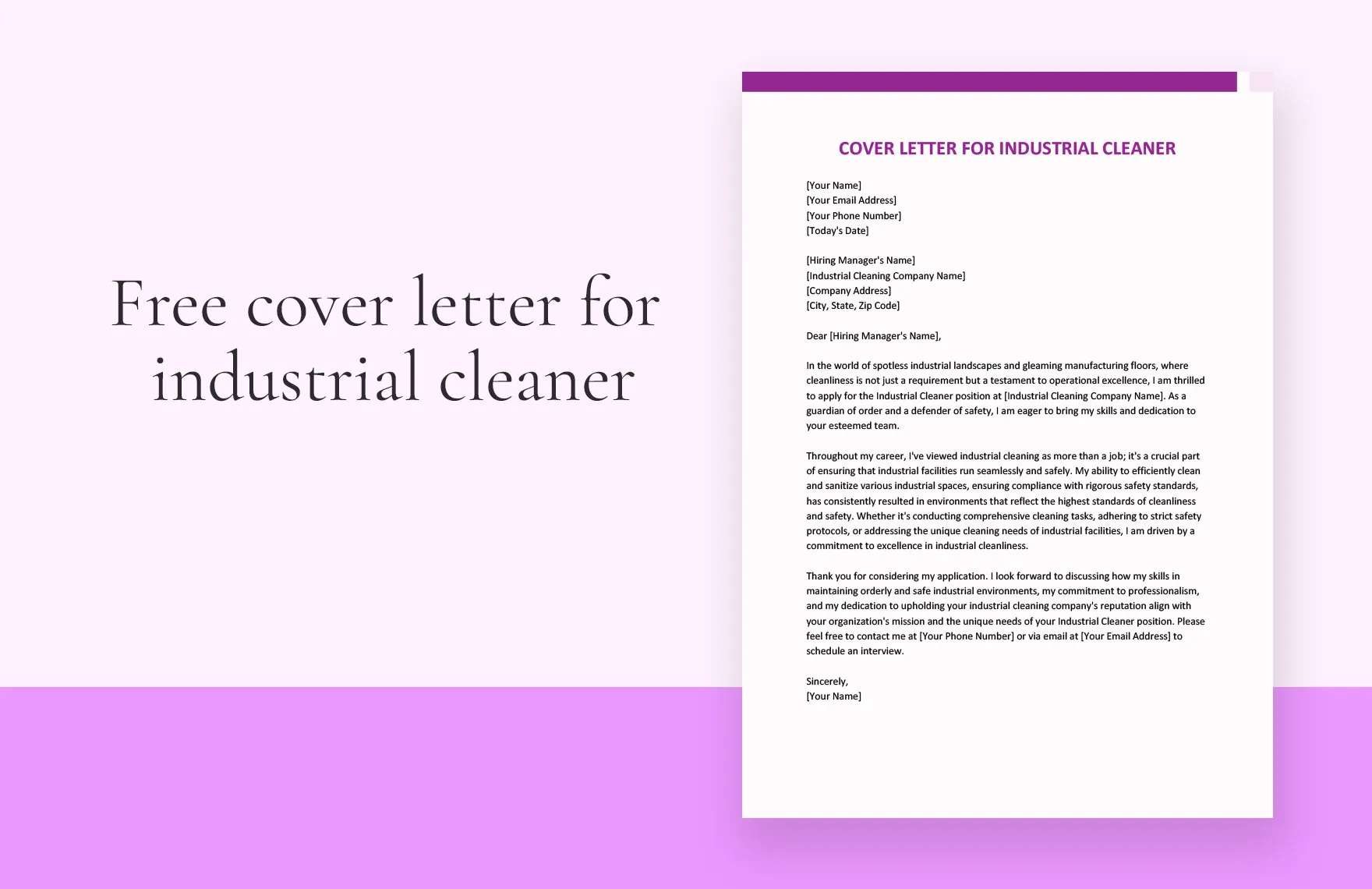
Start your cover letter with your contact information, including your full name, address, phone number, and email address. Make sure your contact information is easy to find and up-to-date. This ensures that the employer can easily reach you if they want to proceed. After your contact details, include the date, followed by the employer’s contact information if you know it, such as their name and job title. Use a professional salutation, such as “Dear Mr./Ms. [Last Name],” or “Dear Hiring Manager,” if you do not know the hiring manager’s name. Avoid informal greetings. A professional and organized presentation is key to making a positive first impression.
Writing the Body of the Cover Letter
The body of your cover letter should highlight your relevant skills and experiences. Start with an introductory paragraph that states the position you’re applying for and where you saw the job posting. In the subsequent paragraphs, explain why you’re a good fit for the job and what you can bring to the role. Use specific examples to showcase your achievements and skills. You can reference past experiences, and explain the responsibilities you held and the positive results you achieved. Keep the tone professional and concise. Focus on how your skills and experience meet the employer’s needs. Keep it direct and informative, demonstrating your suitability for the role. Ensure your cover letter’s body clearly and effectively communicates your value.
Closing Your Cover Letter
Your closing paragraph should be a polite and professional way to end your cover letter. Thank the employer for their time and consideration, and reiterate your enthusiasm for the position. It’s also important to include a call to action. For example, state that you’re available for an interview at their earliest convenience. End your cover letter with a professional closing, such as “Sincerely” or “Best regards,” followed by your name. A strong closing paragraph reinforces your interest and leaves a positive final impression, increasing the likelihood of a response. This professional and thoughtful closing ensures your application ends on a positive note.
Proofreading and Editing Your Cover Letter
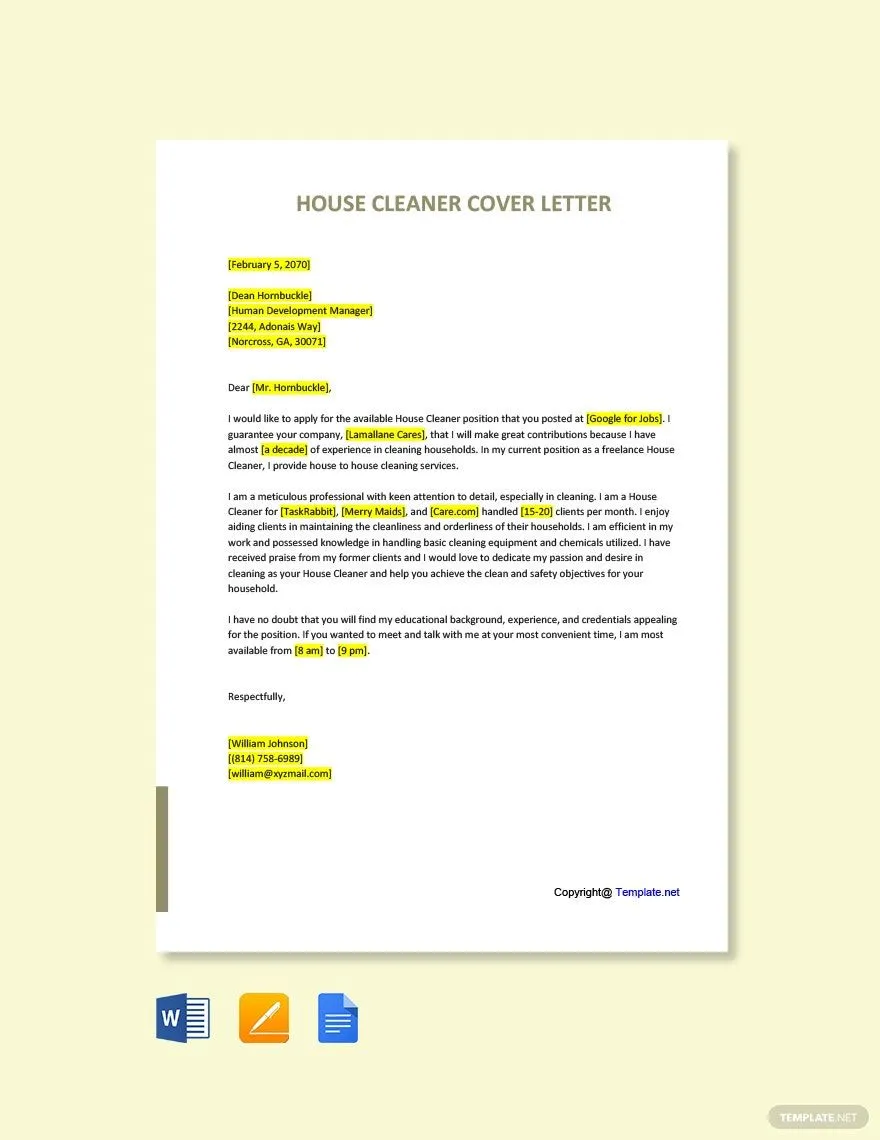
Proofreading and editing are essential steps in the cover letter writing process. Proofreading can help you find and fix any grammatical errors, spelling mistakes, and formatting issues. To improve your chances of success, review your cover letter for clarity, accuracy, and professionalism. Read your cover letter multiple times, and ideally, have someone else read it as well. Correct any errors and ensure the tone is appropriate. A polished cover letter shows attention to detail and a commitment to quality, which are essential qualities for a cleaner. It also makes your cover letter more professional, showing that you are dedicated and detail-oriented. This will set you apart from other applicants, making you a desirable candidate.
